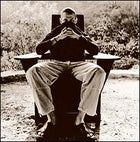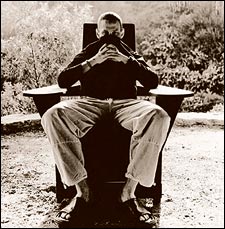���ϳԹ��� editor-at-large Hampton Sides recently spoke to Lance Armstrong as he was kneaded, buck naked, on a massage table in the Hollywood home of his rock-star girlfriend, Sheryl Crow. Here, read an exclusive excerpt of the interview from ���ϳԹ���’s July 2004 issue, available on newsstands now!
Lance Armstrong, Tour de France 2004
 Le Man: Armstrong in Los Angeles, 2004
Le Man: Armstrong in Los Angeles, 2004 OUTSIDE: Did you ever imagine that you’d be in the position you’re in now? Five and one to grow on?
ARMSTRONG: No. After the first one, I thought that could be the only one. And after the second one. After winning three, I realized that maybe I could continue.
I’m interested to hear what you think of the rap cycling has gotten from EPO and other drugs. It must suck to work in a sport that has a cloud hanging over it. How do you deal with skeptics who assume there’s no way you can do it without drugs?
I try to take a longer view and think about 10, 20, 30 years from now, when those victories don’t have an asterisk beside them. I read everything that happens with cycling and I’m as amazed as anybody else, because I think that, clearly, drugs work. But they don’t work as good as hard work. And I know that for a fact.
And, of course, they kill you—sometimes.
Well, it depends. There’s this whole preconceived notion about EPO and young riders dying. I would be very interested to compare every other sport—cycling, running, basketball, hockey, football, baseball—and total up how many young athletes have passed out, or passed away, on the field. If it happens on the basketball court, nobody says anything. If it happens on the soccer pitch, nothing. But if it’s cycling, they say, “Drugs.” I wouldn’t say it’s not true, because I don’t know. But I certainly don’t think it’s fair in comparison to other sports.
Do you still think about cancer?
Of course. I’m not scared on a daily basis of getting sick again. I feel healthy and strong; I feel confident that I’m cured of the disease. But this illness is a real bastard. If I said I didn’t have any respect for it, I have this idea that it would be listening to me say that. There are millions and millions of people whose lives are constantly affected by cancer either personally, or through friends, families, neighbors, or co-workers. So, that I think about. Cancer’s not something you kill with one pill, or one therapy, or one procedure. It’s hundreds of illnesses that you have to go and chip away at. I’m realistic, and I respect it because of what I’ve been through.
You’re going around the country and meeting people who are fighting cancer, and the feedback you get from them—I’m wondering if that inspires you.
It does, totally. When I’m out the door and things aren’t going that well or I’m having a tough time, they help to get me through that. It’s inspiring for me to know that somebody might be sitting in a hospital somewhere watching the Tour de France on TV. To even think that they would be sitting there feeling stronger or better or more optimistic about their situation because of a guy winning a bike race—that’s a thrill for me.
When you’re training, do you consciously think about number six?
I try not to think about that, but obviously I get reminded of it daily. There’s even days where I get reminded about winning number seven! I’m like, Wait a minute. It’s a little too much pressure to think about a grand total, especially a grand total that’s never been done before.
How do you want to be remembered?
Quite honestly, I don’t care about having a long-term legacy. I don’t mean that in a bad way. It’s just that I think it would be incredibly arrogant to walk through my day thinking about it. That’s not why I get up every morning.
Why do you then?
To train hard and win another bike race. If in 50 years they name a street after me, or build me a statue, that’s fine. But quite honestly, I live for these days now.
To read the rest of this interview, pick up a copy of ���ϳԹ���‘s July 2004 issue, available on newsstands everywhere.

